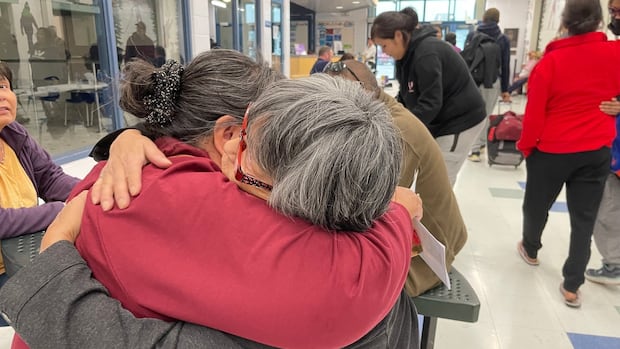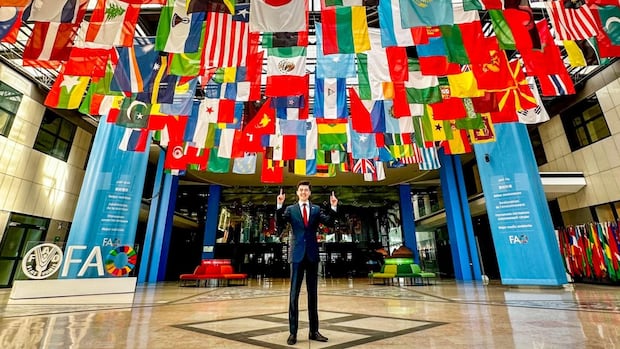Alex Laferrière was so frustrated by the treatment he, his wife and infant son received from Air Canada when their flights were delayed last July that he filed a complaint with the airline regulator.
But he was even more disturbed to learn that the Canadian Transportation Agency (CTA) has a backlog of complaints — over 87,000 — and it could take over two years for his case to be resolved
“I thought, are you joking?” said Laferrière, from his home in Sturgeon Falls, Ont. “That delay is completely unreasonable.”
And now, new data obtained under Access to Information and provided to Go Public shows that backlog could increase dramatically — by as much as 45 per cent by 2028.
“That’s absolute nonsense,” said Laferrière. “The system seems broken.”
An air passenger advocate agrees, and blames lengthy delays on the CTA’s method of adjudicating complaints.
- Got a story you want investigated? Contact Erica and the Go Public team [email protected]
“The system is way too complicated,” said Gábor Lukács, founder of Air Passenger Rights. “It requires an unreasonable amount of resources to deal with each complaint.”
The CTA is an independent, quasi-judicial agency that reports to Parliament through Minister of Transport Chrystia Freeland.
A spokesperson for Freeland said in a statement that the waitlist “must be addressed” and that the government is working to improve air passenger protections.
Data regarding the backlog was obtained through Access to Information by public policy researcher Ken Rubin, who asked the CTA to project the number of complaints passengers will submit over the next three years.
It provided low-, mid- and upper-range projections for 2025-26, 2026-27 and 2027-28, based on forecasting done in May 2023.
WATCH | Lengthy delays at CTA:
In an email to Go Public, a spokesperson said the projections were, in part, “based on historical complaint volumes” but that the number of complaints has “continued to increase year over year,” so the predictions could be low.
Using the best-case prediction — which assumes the number of complaints filed drastically drops and the CTA continues to close them at its most recent rate — the backlog could decrease to 63,763 by 2028.
But complaint volumes have been increasing since the CTA did its forecast.
Using the worst-case projections, by 2028 the backlog could reach 126,000 — an increase of 45 per cent.
That means disgruntled passengers could be left waiting well over three years for a decision.
“I work in customer service at a credit union,” said Laferrière. “If I told someone they have to wait 36 months for a mortgage, that would not be acceptable.”
What’s causing the backlog?
Lukács says the problem is that complaints about flight disruptions are broadly categorized into three groups: situations within the airline’s control, situations within the airline’s control but required for safety, and situations outside the airline’s control.
“We have an unnecessarily and disproportionately complex regime,” said Lukács. “Which necessitates an extraordinary amount of evidence and a disproportionate amount of judicial time to decide whether compensation is owed.”
Lukács advocates adopting the European Union’s system, where airlines can only avoid paying compensation under “extraordinary circumstances” — which do not include maintenance, many safety issues and staffing shortages.
“In the vast majority of cases, eligibility becomes a very quick administrative task that can be done by people with very basic training,” said Lukács.
Call for harsher penalties
The other issue, says Lukács, is the lack of steep penalties when airlines refuse to compensate passengers who are clearly owed compensation and are then forced to file with the CTA.
In one example reported on Lukács’s Air Passenger Rights Facebook page, a WestJet passenger’s flight was delayed over seven hours but the airline denied her compensation, claiming it was a safety issue.
When the CTA investigated and requested evidence, the airline didn’t provide any and eventually paid the $700 owed under the Air Passenger Protection Regulations.
“There is no incentive for the airline to pay a perfectly valid legitimate claim under the rules,” said Lukács. “Even where the airline has no evidence to support its position, they’re just going to refuse to pay because most passengers may not have the stamina to pursue their case.”
Laferrière says he knows four other people who experienced the same flight delays as his family, but none filed CTA complaints.
“Everyone said, ‘Good luck. We’re not going to waste our time with this,'” he said.
Any penalties “should ensure that it becomes less profitable to break the law than to comply with the law,” said Lukács. “The purpose is fostering compliance.”
Slow to implement cost recovery scheme
In 2023, the federal government called on the CTA to implement a cost-recovery mechanism, which would force airlines to contribute to the cost of the complaint resolution process.
The CTA proposed charging airlines $790 for each eligible complaint closed by the agency.
Lukács says the penalty should be significantly higher, but payable only when “the complaint is found to have at least some merit.”
The cost-recovery plan has yet to be implemented, despite the CTA chair and CEO France Pégeot’s saying one would be in place by the end of last year.
A CTA spokesperson said there is no date set for the fee to be enacted.
Since the CTA began consulting on the proposal last September, WestJet has met with various government officials at least 17 times to discuss, among other things, the CTA’s “cost recovery proposals,” lobbying records show.
Air Canada has also lobbied government officials more than 20 times since last fall, but its monthly lobbying reports are less specific than WestJet’s, listing only “transportation” or “aviation related policies, legislation and regulations” as the topics discussed.
Two years ago, Ottawa designated almost $76 million to improve the complaints resolution process, yet the backlog has steadily increased.
The government is in the process of updating the regulations — but Lukács says the proposed changes will define the vast majority of flight delays and cancellations as “exceptional circumstances” so no compensation will be owed.
“It’s just rebranding the same old broken system,” said Lukács.
Until that happens, Lukács doesn’t recommend frustrated air passengers turn to the CTA — instead, he encourages them to file complaints in small claims court.
Laferrière says, even though it’s already been almost a year since he filed his complaint with the CTA, he’s going to stick it out — curious to see when his case will be heard.
He says it’s “frustrating” to see taxpayer dollars fund an agency that doesn’t seem accountable.
Submit your story ideas
Go Public is an investigative news segment on CBC-TV, radio and the web.
We tell your stories, shed light on wrongdoing and hold the powers that be accountable.
If you have a story in the public interest, or if you’re an insider with information, contact [email protected] with your name, contact information and a brief summary. All emails are confidential until you decide to Go Public.
Read more stories by Go Public.
Read about our hosts.






